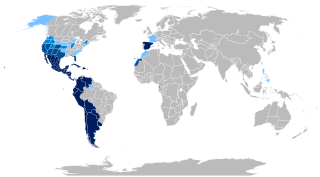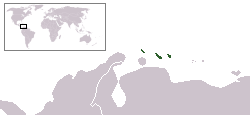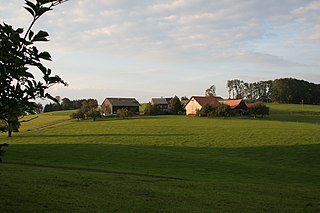
Spanish is a Romance language of the Indo-European language family that evolved from colloquial spoken Latin in the Iberian Peninsula. Today, it is a global language with nearly 500 million native speakers, mainly in the Americas and Spain. It is the world's second-most spoken native language after Mandarin Chinese; the world's fourth-most spoken language overall after English, Mandarin Chinese, and Hindi; and the world's most widely spoken Romance language.

Turkish, also referred to as Istanbul Turkish or Turkey Turkish, is the most widely spoken of the Turkic languages, with around 70 to 80 million speakers. It is the national language of Turkey. Significant smaller groups of Turkish speakers exist in Iraq, Syria, Germany, Austria, Bulgaria, North Macedonia, Northern Cyprus, Greece, the Caucasus, and other parts of Europe and Central Asia. Cyprus has requested that the European Union add Turkish as an official language, even though Turkey is not a member state.

A loanword is a word permanently adopted from one language and incorporated into another language without translation. This is in contrast to cognates, which are words in two or more languages that are similar because they share an etymological origin, and calques, which involve translation. Loanwords from languages with different scripts are usually transliterated, but they are not translated.
In linguistics, and particularly phonology, stress or accent is the relative emphasis or prominence given to a certain syllable in a word or to a certain word in a phrase or sentence. That emphasis is typically caused by such properties as increased loudness and vowel length, full articulation of the vowel, and changes in tone. The terms stress and accent are often used synonymously in that context but are sometimes distinguished. For example, when emphasis is produced through pitch alone, it is called pitch accent, and when produced through length alone, it is called quantitative accent. When caused by a combination of various intensified properties, it is called stress accent or dynamic accent; English uses what is called variable stress accent.

Papiamento or Papiamentu is a Spanish and Portuguese-based creole language spoken in the Dutch Caribbean. It is the most widely spoken language on the Caribbean ABC islands having official status in Aruba and Curaçao. Papiamento is also a recognised language in the Dutch public bodies of Bonaire, Sint-Eustatius and Saba.
A phonemic orthography is an orthography in which the graphemes correspond to the phonemes of the language. Natural languages rarely have perfectly phonemic orthographies; a high degree of grapheme-phoneme correspondence can be expected in orthographies based on alphabetic writing systems, but they differ in how complete this correspondence is. English orthography, for example, is alphabetic but highly nonphonemic; it was once mostly phonemic during the Middle English stage, when the modern spellings originated, but spoken English changed rapidly while the orthography was much more stable, resulting in the modern nonphonemic situation. However, because of their relatively recent modernizations compared to English, the Romanian, Italian, Turkish, Spanish, Finnish, Czech, Latvian, Esperanto, Korean and Swahili orthographic systems come much closer to being consistent phonemic representations.

A hamlet is a small human settlement. In different jurisdictions and geographies, a hamlet may be the size of a town, village or parish, or may be considered to be a smaller settlement or subdivision or satellite entity to a larger settlement. The word and concept of a hamlet have roots in the Anglo-Norman settlement of England, where the old French hamlet came to apply to small human settlements. In British geography, a hamlet is considered smaller than a village and distinctly without a church or other place of worship.

Ottoman Turkish was the standardized register of the Turkish language used in the Ottoman Empire. It borrowed extensively, in all aspects, from Arabic and Persian, and its speakers used the Ottoman Turkish alphabet for written communication. During the peak of Ottoman power, words of foreign origin in Turkish literature in the Ottoman Empire heavily outnumbered native Turkish words, with Arabic and Persian vocabulary accounting for up to 88% of the Ottoman vocabulary in some texts.
An endonym is a common, native name for a geographical place, group of people, individual person, language or dialect, meaning that it is used inside that particular place, group, or linguistic community in question; it is their self-designated name for themselves, their homeland, or their language.

Mexican Spanish is a set of varieties of the Spanish language as spoken in Mexico.

Spanish is a Romance language which developed from Vulgar Latin in central areas of the Iberian peninsula and has absorbed many loanwords from other Romance languages like French, Occitan, Catalan, Portuguese, and Italian. Spanish also has lexical influences from Arabic and from Paleohispanic languages such as Iberian, Celtiberian and Basque.
The lexis of the Romanian language, a Romance language, has changed over the centuries as the language evolved from Vulgar Latin, to Common Romanian, to medieval, modern and contemporary Romanian.

C, or c, is the third letter in the English and ISO basic Latin alphabets. Its name in English is cee, plural cees.

Haketia is an endangered Jewish Romance language also known as Djudeo Spañol, Ladino Occidental, or Western Judaeo-Spanish. It was historically spoken by the North African Sephardim in the Moroccan cities of Tétouan, Tangier, Asilah, Larache and the Spanish towns of Ceuta and Melilla. Tetuani Ladino was also spoken in Oran, Algeria. One of the distinctions between Ladino and Haketia (Haquetia) is that the latter incorporates Arabic.
Arabic has had a great influence on other languages, especially in vocabulary. The influence of Arabic has been most profound in those countries visited by Islam or Islamic power.
A portmanteau or portmanteau word is a blend of words in which parts of multiple words are combined into a new word, as in smog, coined by blending smoke and fog, or motel, from motor and hotel. In linguistics, a portmanteau is a single morph that is analyzed as representing two underlying morphemes.

Judaeo-Spanish or Judeo-Spanish, also known as Ladino, is a Romance language derived from Old Spanish. Originally spoken in Spain, and then after the Edict of Expulsion spreading through the Ottoman Empire as well as France, Italy, the Netherlands, Morocco, and England, it is today spoken mainly by Sephardic minorities in more than 30 countries, with most speakers residing in Israel. Although it has no official status in any country, it has been acknowledged as a minority language in Bosnia and Herzegovina, Israel, France, and Turkey. In 2017, it was formally recognised by the Royal Spanish Academy.

Nicaraguan Spanish is geographically defined as the form of Spanish spoken in Nicaragua. Affectionately, Nicaraguan Spanish is often called Nicañol.

Waray is an Austronesian language and the fifth-most-spoken native regional language of the Philippines, native to Eastern Visayas. It is the native language of the Waray people and second language of the Abaknon people of Capul, Northern Samar, and some Cebuano-speaking peoples of western and southern parts of Leyte island. It is the third most spoken language among the Bisayan languages, only behind Cebuano and Hiligaynon.










